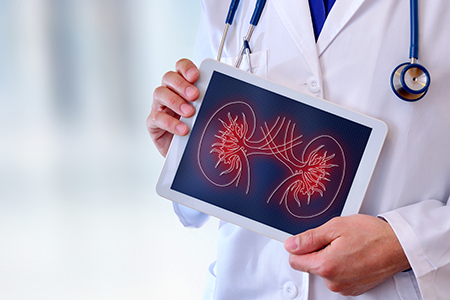Kidney Health - Chronic Kidney Disease Prevention
Every 24 hours, 360 new patients start dialysis treatment for kidney failure¹. Kidney diseases are a leading cause of death in the United States and, in some cases, are preventable. High blood pressure, diabetes, and heart disease all increase the risk of developing chronic kidney disease, which currently affects about 37 million Americans¹.
Diabetes and high blood pressure alone account for 3 out of 4 cases of kidney failure¹. In many cases, a healthy lifestyle is one of the main defenses against kidney disease. If you've been thinking about changing your diet and lifestyle to live healthier, this is a great reason to take the leap.

What are kidneys, anyways?
The kidneys are two fist-sized organs located just below the rib cage. Every 30 minutes, your kidneys filter all the blood in your body, removing wastes, toxins, and excess fluid in the process¹.
Your kidneys assist in many other important functions, too, such as controlling blood pressure, stimulating the production of red blood cells, regulating chemicals and hormones, and protecting bone health.
What can damage the kidneys?
Kidneys are extremely delicate. They are prone to acute injury by medications or other drugs, low blood pressure, severe dehydration, infections, or other conditions which disrupt blood flow to the kidneys, damage the kidneys directly, or block the urinary tract².
The kidneys are also affected by other conditions like high blood pressure, heart disease, and diabetes.
What are the symptoms of Chronic Kidney Disease?
Early kidney disease often has no symptoms. Later stages of the disease can cause:
- Frequent infections
- Loss of appetite
- Depression
- Swollen feet and ankles
- Muscle cramping
- Fatigue
- Dry, itchy skin
- Frequent urination

If kidney disease continues to progress, it can lead to:
- Anemia
- Electrolyte imbalances, like high potassium or low calcium
- Cardiovascular disease
- Kidney failure
What can I do?
Lowering or eliminating your risk factors is one of the best things you can do to help your kidneys. The Centers for Disease Control and Prevention (CDC) recommends¹:
- Keeping blood pressure below 140/90 mm Hg (or the target established by your healthcare provider)
- Treating diabetes and staying in target blood sugar ranges
- Taking all prescribed medication as instructed
- Getting at least 20-25 minutes of physical activity each day
- Managing weight with a kidney-friendly diet
- Quitting smoking
- Getting tested for chronic kidney disease
An active and healthy lifestyle can help prevent conditions like cardiovascular disease, diabetes, and high blood pressure, which are associated with chronic kidney disease.
Talk to a healthcare provider today
Get your annual wellness exam and discuss kidney health with your healthcare provider. For many people, kidney function can be assessed easily and affordably with a few blood tests. For those with health conditions or other risk factors, a healthcare provider can determine which tests are necessary and how frequently testing should be performed.
For more information about kidney health, reducing risk factors, or living a healthier lifestyle, visit the CDC’s website Chronic Kidney Disease Initiative.
REFERENCES
¹Centers for Disease Control and Prevention. (2022, December 01). Chronic kidney disease initiative. U.S. Department of Health and Human Services. https://www.cdc.gov/kidneydisease/index.html
²American Kidney Fund. (2022, April 12). Acute kidney injury (AKI). https://www.kidneyfund.org/all-about-kidneys/other-kidney-problems/acute-kidney-injury-aki